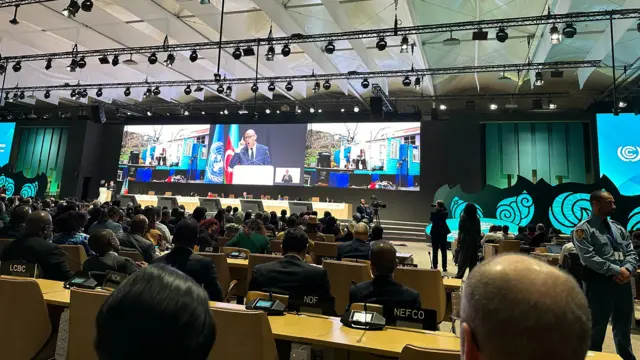We’ll not revert to energy system of 1950s – US climate envoypublished at 13:46 Greenwich Mean Time 11 November
Georgina Rannard
Climate reporter in Baku
Podesta says it’s clear the incoming US administration will try to make a U-turn and reverse climate progress made during Joe Biden’s administration.
But he reassures those in the room here in Baku that “work will continue in the country”.
He lists the growing renewable power in the country, as a result he says of the Inflation Reduction Act deal passed by President Biden.
“Are we facing new headwinds, absolutely, but we will revert to the energy system of the 1950s? No way.
“We will continue to work together here at COP29 with our partners”, he adds, pointing out that Biden and Harris are in power until January.
As a reminder, you can follow what he’s saying by clicking Watch live button at the top of our page.
‘Trump’s relationship to climate change captured by word hoax’ – US climate envoypublished at 13:38 Greenwich Mean Time 11 November
Georgina Rannard
Climate reporter at Baku
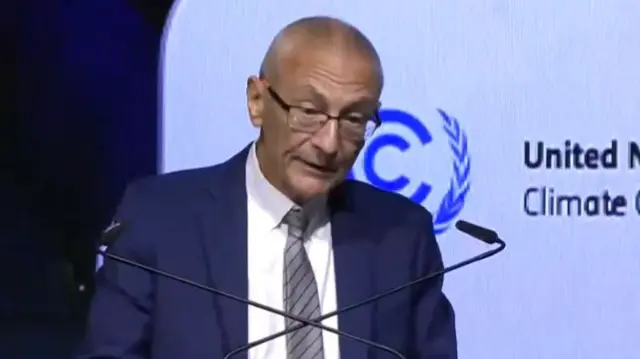 Image source, Reuters
Image source, Reuters
“For those of us dedicated to climate action, the election was bitterly disappointing, particularly because of the unprecedented resource that Biden and Harris brought to the fight,” John Podesta, the US climate envoy, says in this press conference.
He talks about President Joe Biden re-joining the Paris agreement, after Trump left when he was last president.
The election is “more difficult to tolerate as the dangers we face become more catastrophic”, he says.
“His relationship to climate change is captured by the words hoax,” he says about Trump, but adds that “none of this is a hoax, it is real”.
US climate envoy gives much anticipated remarkspublished at 13:35 Greenwich Mean Time 11 November
Georgina Rannard
Climate reporter in Baku
I’m in a press conference where we’re hearing from the US climate envoy, John Podesta. All the journalists in here are hoping he will say something about what the US can do at this COP now that Donald Trump has been elected President.
Trump won’t take power until January but he’s a known climate sceptic and has said he wants the US to leave the landmark Paris deal.
At the past few summits, deals have only been possible when the US and China climate representatives have talked head-to-head.
But that was under the previous US envoy John Kerry, who has now handed over to John Podesta. Mr Podesta is an experienced Washington DC operative and worked for President Barack Obama on climate policy. His Chinese counter-part, Liu Zhenmin, is also new.
Will John Podesta say something about China?
Hungry at COP29? It’ll cost youpublished at 13:09 Greenwich Mean Time 11 November
Justin Rowlatt
Climate editor in Baku
“An army marches on its stomach” it is claimed Napoleon once said, and the same is true of a climate conference.
But as hungry delegates, activists and – yes, us journalists too – trooped into the huge food hall here at COP29 we were astonished by the prices.
My colleague Aygul Mehman, a journalist with the BBC’s Azerbaijani service, was charged 41 AZN (the Azerbaijani currency) for her modest lunch of soup, a bean salad and a dry roll. That’s about £18 ($24).
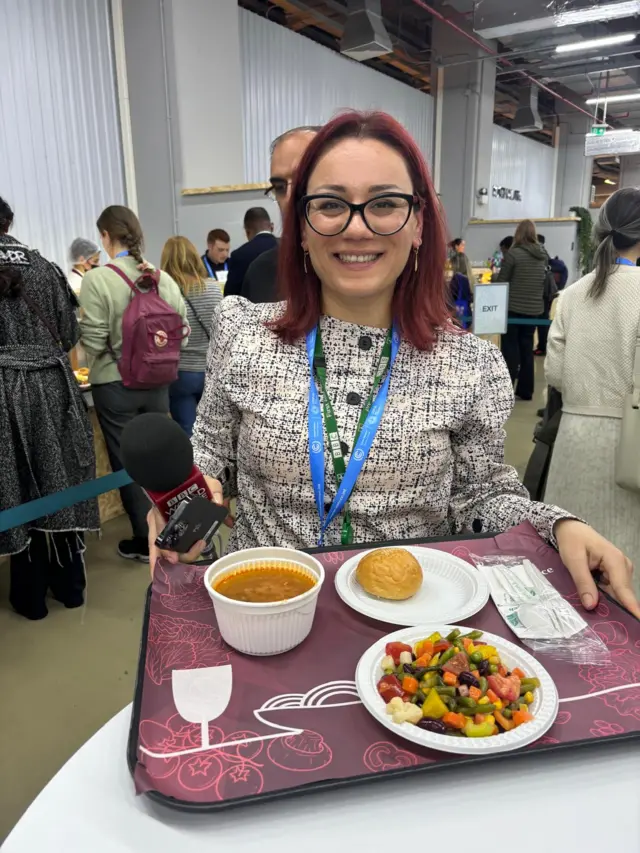
Soup, salad and a roll. Yours for £18 ($24)
“It’s like they are taking money from our pockets,” one delegate told me as we were queuing up.
This is a serious issue. Delegates from poorer nations often complain about how much these big conferences cost them when you add in flights and hotels and the total can come to many thousands of pounds.
That is another hurdle making it harder for developing countries to take part in what should be a global forum.
And in case you’re wondering, I just had soup.
A look inside this year’s climate conferencepublished at 12:26 Greenwich Mean Time 11 November
As COP29 kicks off in Baku today, let’s take a look inside the event.
Delegates representing nearly 200 countries are in the Azerbaijani capital, where one of the focuses will be how to limit long-term global temperature rises to 1.5C from reducing carbon emissions to supporting small island nations as global sea levels continue to rise.
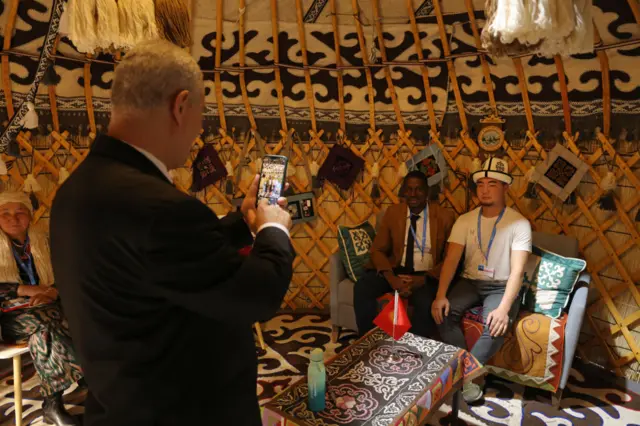 Image source, Getty Images
Image source, Getty Images
Visitors snap photos inside a yurt at the Kyrgyzstan pavilion
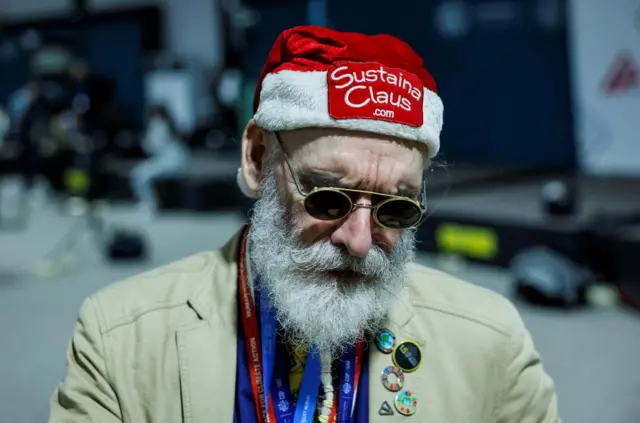 Image source, Reuters
Image source, Reuters
A festive, but on theme, Santa hat
 Image source, Reuters
Image source, Reuters
Giant Matryoshka dolls at Russia’s stand are attracting attention
COP29 president is former Azerbaijan oil executivepublished at 11:40 Greenwich Mean Time 11 November
Mukhtar Babayev, who assumed his place as COP29 president this morning, is Azerbaijan’s minister of ecology and natural resources.
He takes over from UAE technology minister Dr Sultan al-Jaber, who presided over COP28 in Dubai last year.
Babayev spent 26 years at Azerbaijan’s state-owned oil and gas company Socar in a variety of roles, before taking up his political post in 2018.
Azerbaijan has been ruled by President Ilham Aliyev since 2003. He secured his latest term in 2024 in an election which Western observers said fell short of democratic standards.
Under Aliyev’s rule, Azerbaijan has sought to increase its international profile – including hosting the Eurovision Song Contest in 2012, the Baku European Games in 2015, and holding some football matches at the 2020 Euros tournament.
 Image source, Reuters
Image source, Reuters
Dr al-Jaber (left) handed Babayev the COP gavel at the opening of the summit this morning
What’s been done to ‘transition away’ from fossil fuels?published at 11:22 Greenwich Mean Time 11 November
Georgina Rannard
Climate reporter in Baku
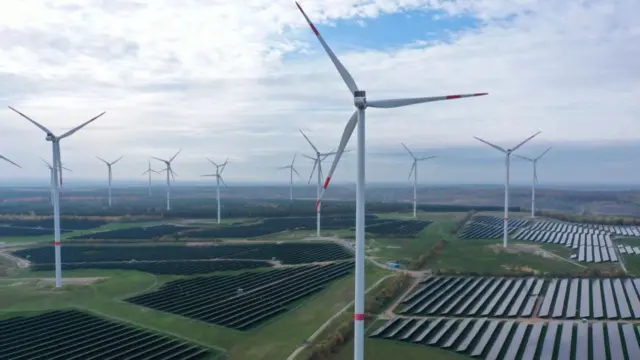 Image source, Getty Images
Image source, Getty Images
Believe it or not, the UN climate talks in Dubai last year were the first ever to agree that countries should “transition away” from fossil fuels.
It sounds like UN jargon, but the deal was celebrated as historic by many because it finally addressed the role that oil, coal and gas play in driving up global temperatures. It was vague, though, without any deadlines or specifics.
And what’s happened since then?
In good news – a massive growth in renewable electricity, such as wind and solar. The International Energy Agency, external (IEA) now predicts that the amounts of electricity generated from solar alone will quadruple from 2023 levels by 2030. At current rates, we will still fall short of a promise to triple all renewable power by 2030 – but it will be close, growing 2.7 times instead, the IEA says.
But fossil fuels still have not peaked. The US has increased its production of oil compared to last year. The use of coal is at record levels, forecasted to be 8.7 billion tonnes for the year, according to the IEA.
Thirst for energy is growing faster than we can build renewable power, some of it driven by our use of data centres and artificial intelligence.
Two-thirds of that increase in global demand was met by fossil fuels last year, according to the IEA. But importantly, the share of the global supply of energy from fossil fuels is falling and renewables are growing.
Didn’t we just have a COP?published at 10:58 Greenwich Mean Time 11 November
Yes, and no.
While the UN has just held a Conference of the Parties (COP) summit in Colombia, that one was quite different from this one.
The meeting in the city of Cali earlier this month was the UN biodiversity summit, where scientists and policy-makers met for talks on what can be done to preserve it.
Biodiversity is the variety of all life on Earth – including animals, plants, fungi and micro-organisms like bacteria.
Together they provide the planet with everything necessary for survival, including fresh water, clean air, food and medicines. Biodiversity matters because humans cannot get these benefits from individual species – a rich variety of living things must work together in tandem as part of an ecosystem.
Plants, for example, are very important for improving our physical environment: cleaning the air, limiting rising temperatures and providing protection against climate change.
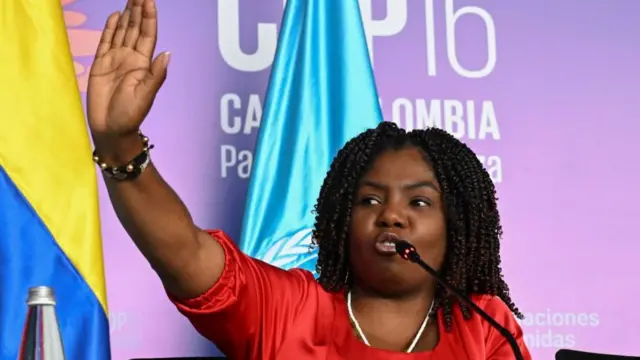 Image source, Getty Images
Image source, Getty Images
Colombian Vice President Francia Márquez at the summit in Cali
You might remember this year’s COP venue from the Eurospublished at 10:38 Greenwich Mean Time 11 November
Georgina Rannard
Climate reporter in Baku
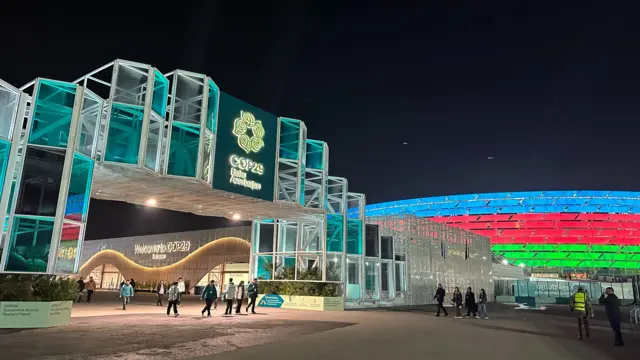
Despite its name, Baku’s Olympic Stadium has never held an Olympic Games – but you might remember it from UEFA Euro 2020. Inside, huge tents and temporary walkways have been built for this year’s UN climate summit, so it’s actually impossible to tell you’re inside a stadium.
It feels like a maze – government delegation offices with flags, NGO pavilions with swag (lots of tote bags), as well as large plenary rooms where the decisions are made.
If you step outside, you see the huge curved white walls of the building – lit up at night with the colours of the Azerbaijani flag. We found one short-cut to the media centre by walking under a road bridge where we think the Wales men’s football team walked to play the Euro 2020 opener against Switzerland.
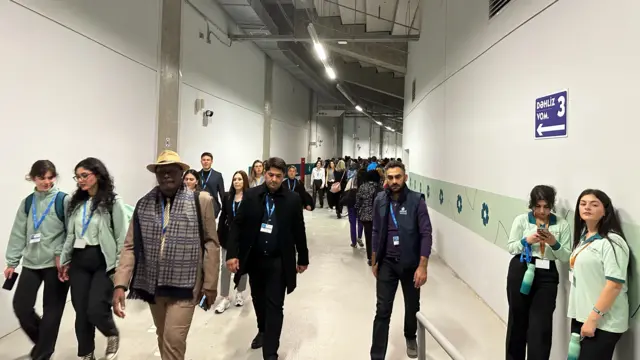
Yesterday, there were rows and rows of potted plants there, presumably waiting to adorn the many meetings rooms.
Somewhere between 40,000 and 50,000 people are expected to attend this COP – much smaller than the nearly 90,000 in Dubai last year.
The numbers are swelling this morning as delegates from around the world land – we’ll bring you stories of people travelling from the most vulnerable parts of the planet, here to try to secure a liveable future for their homes.
World’s ice melting and sea levels rising, UN report findspublished at 10:26 Greenwich Mean Time 11 November
Mark Poynting
Climate and environment researcher
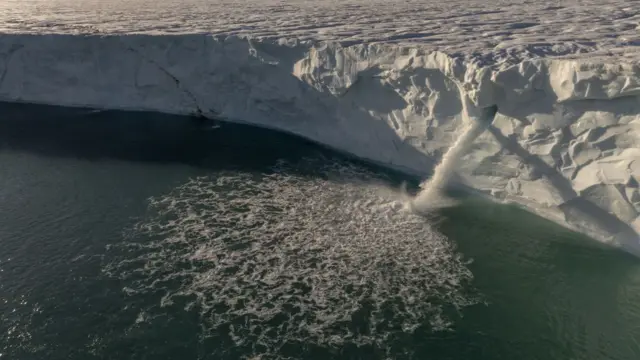 Image source, Getty Images
Image source, Getty Images
As well as the news that this year will likely be the warmest on record, today’s report by the UN’s World Meteorological Organization has other worrying findings:
- Oceans are heating up more quickly. In 2023, the oceans stored more heat than any time on record
- Glacier melt is increasing. The amount of ice lost by the world’s glaciers in 2023 was the highest since measurements began in 1953
- Sea level rise is accelerating. From 2014-2023, global average sea levels rose by 4.77mm (0.19in) per year – double the rate between 1993 and 2002
- Sea ice is shrinking. In 2024, the yearly minimum sea-ice extent in Antarctica and the Arctic was respectively the second lowest and seventh lowest since we’ve been able to monitor this with satellites.
While concerning, these findings are in line with what climate scientists have been warning for many years.
COP hosts Azerbaijan to suffer in a warmer worldpublished at 10:18 Greenwich Mean Time 11 November
Matt McGrath
Environment correspondent in Baku
COP29 hosts Azerbaijan have been making headlines for all the wrong reasons, with allegations that they are using this meeting to make deals on developing their vast gas resources found in the Caspian Sea.
This little-known country, squeezed between Russia and Iran in the Caucasus region, is now one of Europe’s biggest suppliers of oil and gas.
But as well as contributing to the causes of global warming, Azerbaijan is suffering major impacts.
A study, external released by Christian Aid, shows that the country will endure the most economic harm from rising temperatures in Eastern Europe.
By 2050, the country’s GDP – which measures the size of the economy – could shrink by 8.5%.
As well as getting hotter, the report forecasts Azerbaijan will suffer more erratic rainfall and severe flooding – with huge impacts on agriculture, tourism and increased tension over water supplies.
The report points out that this year’s COP hosts current plans for cutting carbon emissions are rated as “critically insufficient”.
So it will be interesting to see if Azerbaijan comes up with a new, stronger carbon plan here at COP, given the implications for the country.
A year of extreme weatherpublished at 10:02 Greenwich Mean Time 11 November
Mark Poynting
Climate and environment researcher
This year’s talks come after a run of deadly extreme weather events around the world.
These range from a blistering heatwave in west Africa in March and April to the intense downpours that hit central Europe in September.
Both of these events – and many others – were made much worse by human-caused climate change, according to the World Weather Attribution group.
And until the planet stops warming, many extreme weather events are likely to get even stronger, and happen more often, climate scientists warn.
They say this is why it is so important for poorer nations to get the funds they need to help with preparations for more intense weather extremes.
As we’ve been discussing, this is the main focus of the COP29 talks over the next couple of weeks.
In pictures: Delegates arriving in Baku for summitpublished at 09:43 Greenwich Mean Time 11 November
With the 12-day-long COP29 just getting underway, we’ve some pictures of delegates and visitors arriving for the summit in Baku:
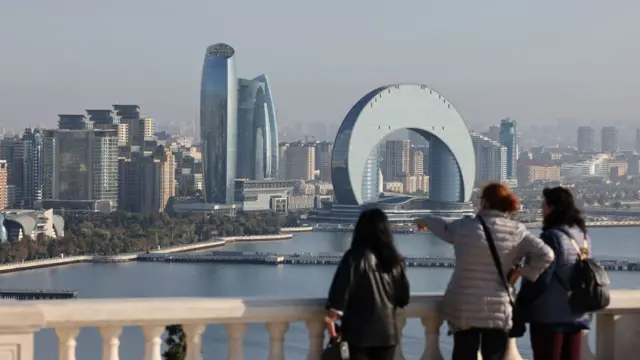 Image source, Getty Images
Image source, Getty Images
The talks are being hosted in the Azerbaijan capital of Baku, a city built on oil wealth
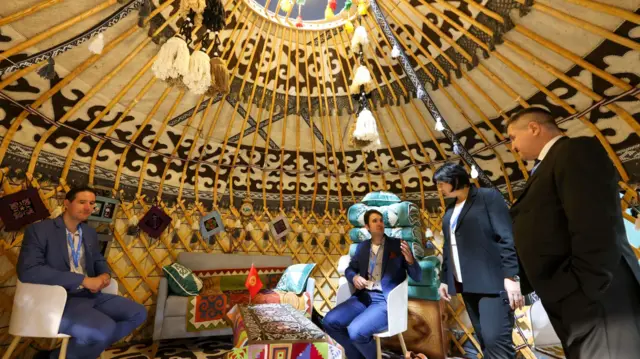 Image source, Getty Images
Image source, Getty Images
Attendees meeting inside a yurt at the Kyrgyzstan pavilion at the conference centre
Greta Thunberg refuses to attend COP29 over human rights and ‘greenwashing’published at 09:31 Greenwich Mean Time 11 November
 Image source, EPA
Image source, EPA
Climate activist Greta Thunberg says she will not be attending COP29 because the event is “greenwashing”.
Host nation Azerbaijan “has no ambition to take climate action”, she says.
Writing in today’s Guardian newspaper, Thunberg argues that Azerbaijan is “planning to expand fossil fuel production” – with state petrochemicals company Socar’s oil and gas accounting for nearly 90% of the country’s exports.
This is “completely incompatible with the 1.5C limit and the goals of the Paris agreement on climate change,” she says.
Thunberg also argues that the COP meetings have “allowed authoritarian regimes like Azerbaijan and the two previous hosts – the United Arab Emirates and Egypt – to continue violating human rights”.
Describing Azerbaijan as a “repressive state”, she mentions the “human rights violations committed by Azerbaijan’s Aliyev regime” against ethnic Armenians living in the Nagorno-Karabakh/Artsakh region.
Many attendees of this year’s COP are “scared to criticise the Azerbaijan government,” Thunberg adds.
Climate talks in a city that smells of oilpublished at 09:18 Greenwich Mean Time 11 November
Georgina Rannard
Climate reporter in Baku
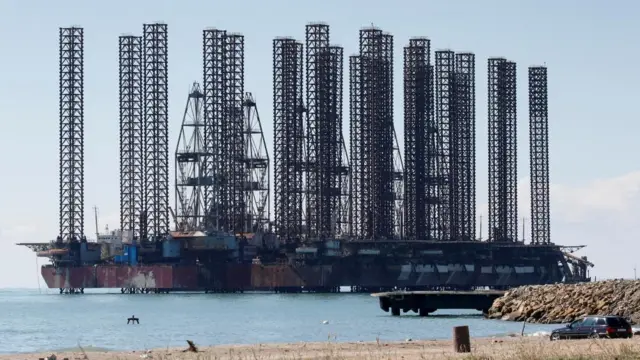 Image source, Reuters
Image source, Reuters
An offshore oil rig in the Caspian Sea near Baku
Oil and gas make up more than 90% of Azerbaijan’s exports – which doesn’t make Baku seem the best place for climate talks. It’s hot off the heels of Dubai in the United Arab Emirates hosting last year.
So why here?
The COP presidency rotates around five regions – this year it was Eastern Europe’s turn. Bulgaria originally wanted to be the hosts, but Russia blocked that move. So, Baku was chosen instead.
I thought it was just a rumour that the city “smells of oil” – but today as our team walked in under green and blue arches reading COP29 Baku, it felt like walking through a huge petrol station. The smell was almost overpowering, and I can still feel it now as I’m writing.
The country also has a bad record on human rights with severely limited freedom of speech and no right to protest, according to Human Rights Watch. , externalMany experts here say that Azerbaijan’s reliance on fossil fuels means it can’t get a strong deal on climate – but others say everyone needs to be at the table to solve climate change.
The United Arab Emirates was the first to submit an updated climate action plan (called Nationally Determined Contributions) to the UN last week, ahead of the deadline in February.
What is the 1.5C target?published at 09:05 Greenwich Mean Time 11 November
The Paris Agreement aims to limit global temperature rises to 1.5C, and to keep them “well below” 2.0C above those recorded in pre-industrial times
Nearly 200 parties adopted the legally binding international treaty on climate change at COP21 – nine years ago.
Just last week, it was projected that 2024 would be the first year to breach the 1.5C global warming limit.
It’s also expected to break the record again, for the hottest year on record.
2024 to be warmest year on record, UN sayspublished at 09:00 Greenwich Mean Time 11 November
Breaking
Mark Poynting
Climate and environment researcher
The UN’s World Meteorological Organization (WMO) has just said that 2024 is on track to be the world’s warmest year on record.
The WMO says that the global average temperature between January and September has been around 1.54C above those of the late 19th Century.
Back in Paris in 2015, almost 200 countries pledged to try to limit long-term temperature rises to that level, hoping to avoid some of the worst impacts of climate change.
But the UN says this 1.5C target has not yet been breached, because it refers to a longer term average.
Trump and the Paris Agreementpublished at 08:40 Greenwich Mean Time 11 November
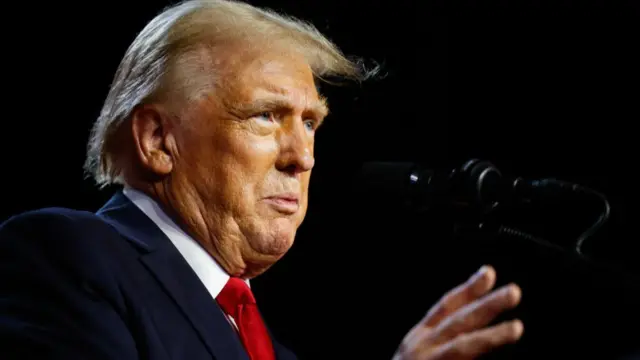 Image source, Getty Images
Image source, Getty Images
It took Donald Trump more than three years to remove the United States from the 2015 Paris Agreement.
But three months later, on his first day in office, Biden reversed, external that decision in February 2021.
So will Trump do the same again?
On Friday, the New York Times reported that the president-elect’s transition team has already prepared executive orders and proclamations on withdrawing from the Paris climate agreement again. It also reported on shrinking the size of some national monuments to allow more drilling and mining.
Trump is also expected to end the pause on permitting new liquefied natural gas exports to big markets in Asia and Europe and revoke a waiver that allows California and other states to have tighter pollution standards, according to the report.
Trump victory is a major setback for climate action, experts saypublished at 08:31 Greenwich Mean Time 11 November
Matt McGrath
Environment correspondent
Experts say Donald Trump’s return to the White House are likely to have a hugely negative effect on climate change action in the short-term, but the longer term impact of his re-election as US president is less certain.
With world leaders meeting at COP29, the Trump victory will be seen as a huge roadblock to progress in both cutting emissions and raising cash for developing countries.
The US president-elect is a known climate sceptic who has called efforts to boost green energy a “scam”.
But with renewable energy gaining a strong foothold in the US and popular support for wind and solar, Trump’s efforts to ramp up oil and gas instead may be less effective.
While climate change did not play much of a role in this year’s campaign, Trump’s likely actions in office this time could be far more significant than in 2017 – when he announced the US would pull out of the Paris climate agreement, the most important UN process to tackle climate change.
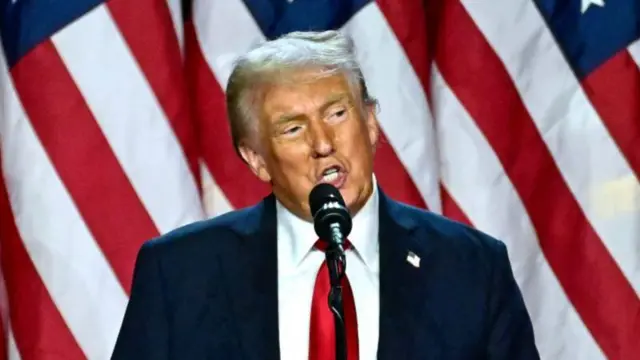 Image source, Getty Images
Image source, Getty Images
‘Do you want your grocery and energy bills to go up even more?’published at 08:19 Greenwich Mean Time 11 November
Georgina Rannard
Climate reporter in Baku
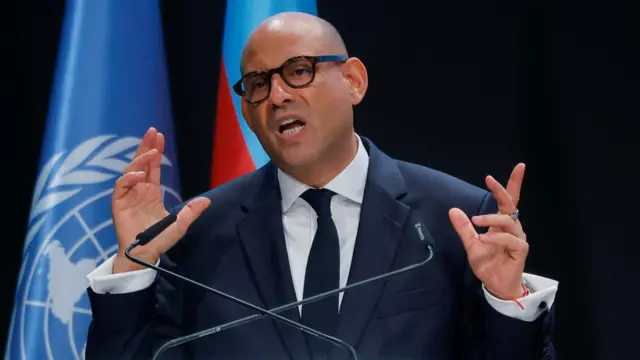 Image source, Reuters
Image source, Reuters
The UN climate envoy, Simon Stiell, has just addressed the COP. He shows a photograph of him standing next to his 85-year-old neighbour, a woman called Florence, on Carriacou island, Grenada.
She’s standing in the ruins of her home after hurricane Beryl pummelled the Caribbean in July this year.
He tries to bring this down the level of the individual, asking:
- “Do you want your grocery and energy bills to go up even more?
- Do you want your country to become economically uncompetitive?
- Do you really want even further global instability, costing precious life?”
Stiell says that if the answers to those questions are no, then progress at these talks is essential.
One important issue he mentions is something called Article 6 in the landmark Paris Agreement (the 2015 deal when countries agreed a roadmap for tackling climate change).
It’s complicated, but Article 6 is about how to get international carbon markets up and running – or how nations can trade on reducing emissions.
